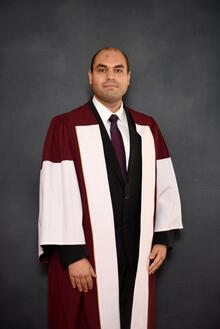Introducing Mohamed
 Mohamed Dardir's post-secondary education began with a Bachelor’s and Master’s in Architecture, followed by a PhD in Building Engineering from Concordia University in Montreal, Quebec. In December 2021, Mohamed transited to his current postdoctoral position at the University of Waterloo in Sustainability and Environment
Mohamed Dardir's post-secondary education began with a Bachelor’s and Master’s in Architecture, followed by a PhD in Building Engineering from Concordia University in Montreal, Quebec. In December 2021, Mohamed transited to his current postdoctoral position at the University of Waterloo in Sustainability and Environment
Mohamed’s multidisciplinary research route highlights his exposure to and experience in various research environments. He has also published several journal papers, book chapters, and presented his research at conferences.
Research at Waterloo
Distilling Mohamad’s research experience down to one word is easy: collaboration. At Waterloo, Mohamed researches the environmental and ecological modelling of urban micro-environments with a focus on urban health. His research goal is to improve a microclimate model to assess heat mitigation strategies including environmental and economic benefits, community health and resilience, and risk and disaster mitigation. Even before starting his current appointment at the University of Waterloo, Mohamad collaborated with the Waterloo research team. This prior collaboration meant nearly everything about the research and technical details were expected and planned.
Though the research and technical details were as planned, Mohamed, still faced challenges in conducting research, specifically regarding access to secure and confidential data. During the long wait times and complicated application processes, Mohamed receives support from his mentor: “The support I found from my mentor was exceptional to overcome a lot of hard times.” Mohamed’s research team is also keen to collaborate with other research groups in similar fields of study to facilitate research needs and overcome challenges.
Through collaborative activities and professional networking, Mohamad’s research team garnered the support of policy makers and stakeholders both financially and with decision-making and ideation. Through networking, Mohamed had the opportunity to collaborate with the York Region and the Government of Nova Scotia, as well as share his passion and research with other provincial governments. In his words, “This put our research into an elevated level of applicability and acceptance from decision-making point of view approaching the usual gap between policy and research.” Mohamed also mentioned that these collaborations are the greatest achievement in his postdoctoral experience, and reiterates that “collaboration is the key”.
Advice to postdocs
To aid in facilitating research, Mohamed recommends all postdocs to collaborate with fellow research groups. Mohamed describes, “Sometimes, you discover that other groups (sometimes closer than you think) have resources or reached some conclusions that you really need in your research.” As a result, sharing research, strategies, and resources benefits all participating researchers.
For postdocs hoping to publish their work, Mohamed encourages them to simply start publishing. He says, “Once you start, you will have confidence to continue. Don’t lose hope even if you experienced hard times (like rejection sometimes), try to keep trying.” Doubts and hesitation will only delay the publishing process, so try to minimize these as much as possible.
Lastly, Mohamed advises postdocs to take action to bridge the gap between technical research and executive policies as it provides meaning to researchers’ findings and achievements. He urges researchers to seek out programs, such as Mitacs, that will support researchers in policy actions.
Related Resources
- The Office of Research has many supports for postdocs, covering everything from research data management to research ethics and equity.
- Mitacs supports connecting private sector with post-secondary institutions to solve challenges, and also offers training for postdocs.









